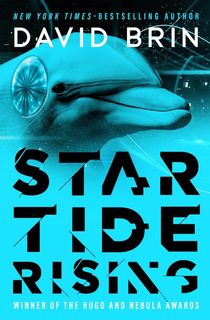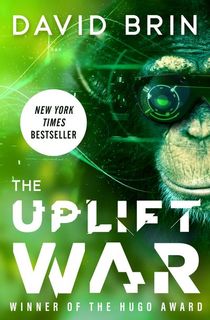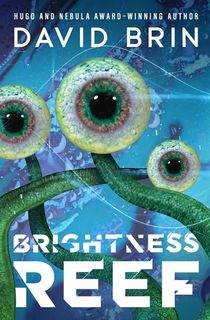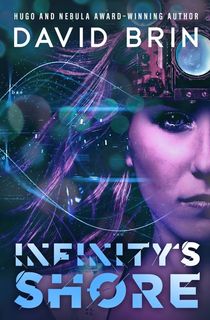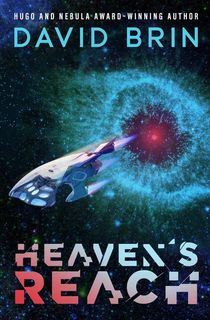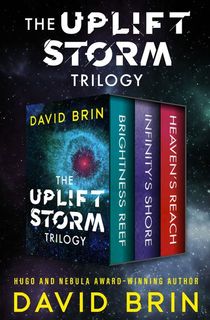Since 1980, David Brin's Uplift books have been heralded as the best of the best in optimistic sci-fi. The six Uplift novels follow the complex relationships between advanced, 'patron' species and societies, and the more primitive species that they uplift to sentience.
Filled with galactic politics and highly-intelligent dolphins and chimpazees, the Uplift universe displays the scientific acumen and imagination of Brin, who won a Hugo, Nebula, and Locus Award for the Uplift book Startide Rising.
Now, Brin's Uplift books are available in brand-new editions through Open Road Media. See the new cover designs below, and read a passage from Brin's introduction to the latest edition of Startide Rising!
Read an excerpt from David Brin's new introduction to Startide Rising, and then download the book!
My second novel … and some think it’s my best. That’s got to rouse mixed feelings, right? And, given how many “best-ever” lists feature Startide Rising, I suppose I ought to live with it!
Well, sure, the tale includes some of my favorite characters and scenes. Still, what seems to have engaged readers most, drawing them back to this novel, is the range of ideas.
Especially uplift. The notion that one sapient, technological species (and possibly we are first in the galaxy) might scan the other life-forms around them, spot some promising candidates, and start meddling to give them a boost—a suite of mental tools that speed them along the path ahead, letting them speak, invent, argue and contemplate anew. And once they have achieved such prowess, might those who had been uplifted carry on the tradition, passing this mixed blessing to others?
Obviously, this harkens to the most central activity of life. Parenthood, or raising new generations with the tools they need for success—only no longer limited to the parochial confines of just one species.
Now, to be clear, I did not invent the concept! One might argue that the Book of Genesis is an uplift tale, and certainly the legend of Prometheus. Within modern science fiction, Mary Shelley, H. G. Wells, Pierre Boulle, and Cordwainer Smith all pondered this general concept long before I did, though always conveying the same overall morality tale, assuming that the process would be abused! That humans, arrogant in bestowing this boon—usurping the powers of Creation—would then spoil things by enslaving their clients or adoptees. And for this wanton cruelty, we masters would then deserve a fierce comeuppance—the same vengeance visited upon Dr. Frankenstein.
Of course, that is one possible (and despicable) outcome. Those predecessors—Wells and Smith and the others—told some damn good “warning” stories, with a shared, wholesome message:
“Don’t misuse such powers, or treat your new fosterlings badly. Don’t be a bad dad or mom.” Those tales were important parts of my upbringing and I appreciated the shared lesson. And yet, after seeing it repeated over and over, I concluded that vein was overworked, to the point of cliché.
RELATED: 10 Science Fiction Books Written by Actual Scientists
And so I wondered...
What if we someday begin modifying higher animals—and I think we clearly will—guided by the morality of modern liberal society?
What if we do attempt this daring act of hubris, only filled with hyper-tolerance and eagerness for diversity?
My uplift novels portray a future in which newly-sapient dolphins and apes have many rights of citizenship and may speak their minds. Their sages serve on our councils, offering their own styles of wisdom, art, and insight, enriching an Earth civilization that is no longer only human.
It’s an attractive outcome … though the path to get there is fraught with dangers and moral hazards. Moreover, even if we do almost everything right, with loving intent, there nevertheless will be pain along the way.
As we expand our understanding of how the brain works and learn more about the genes involved in intelligence, will we reach a point where we can pull other species onto our intellectual plane? Don’t dismiss this as “mere sci-fi.” Preliminary work is already underway. We are rapidly tracing the genetic mutations that empowered a sub-population of Homo erectus to transform into something theretofore never seen on planet Earth—or possibly anywhere “in the galaxy. It “appears that only a few dozen protein and regulatory genes may have made the crucial difference. Already, some of these alterations are being tried in laboratory mice, so we’ll better understand some tragic human ailments.
There are, at present, rules against performing such gene-insertion experiments on higher creatures like apes. But when the prospect looms closer, can you doubt trials will begin? If it isn’t allowed in the transparently accountable scientific community, then it will happen in secret laboratories, and may indeed have already begun. Frankly, I’d rather see this realm explored in the open, under relentless transparency and scrutiny, than let it turn into some secret, Michael Crichton–style excuse for later, I-Told-You-So regrets.
Want an example?
"The gene for the protein called FOXP2 has been firmly linked to human speech and language. Humans with just one functional copy of this gene experience difficulties in learning and struggle with spoken and written language,” says behavioral neuroscientist Kyle Smith. “The gene itself is not unique—chimps have a version of it. But because the human and chimpanzee lineages diverged roughly 6 million years ago, they don’t have two key changes in amino acids that humans have evolved.”
And so it begins. We are fated to see interesting times.
When and if we do make new and cleverly mindful beings—and all of this applies equally well to AI or artificial intelligences—may they view their “parents” with tolerance and forgiveness … as do most of each generation of children.
Startide Rising is not “Book One” of the Uplift Saga. My first novel, Sundiver, is a sci-fi murder mystery about voyages to our nearest star, during which uplift themes are explored. My twenty-first century novel Existence has a subplot that’s set even earlier, relating the beginnings of dolphin uplift.
And of course, the series continues with The Uplift War, which, like Startide, won the Hugo Award for best novel. The Uplift War takes us out to the Civilization of Five Galaxies, where humanity learns that this tradition of raising up clever animals held sway for a billion years before upstart Earthlings stumbled upon the scene, in a chain of patrons and clients that helped to prevent interstellar ecological calamity … at some cost.
And then there is the Uplift Storm Trilogy—three novels that begin with Brightness Reef, set on a little backwater planet colonized “by half a dozen refugee “species, fleeing harsh Galactic justice. Only later, in Infinity’s Shore, the scope expands with interstellar, intergalactic, even pan-galactic adventures, ructions, and cosmic implications that come to a head in Heaven’s Reach. I’ll talk more about that trilogy in an introduction to the new edition of Brightness Reef.
You are reading this because I recovered rights to these novels from my original publisher, Bantam (then Random House, then Penguin) Books, after up to forty years in continuous print. And I’m now proud to be offering these somewhat polished-up, refreshed editions though Open Road Media.
But you didn’t purchase this new edition in order to read my reminiscences or other introductory blather. So I’ll cut this short, to be continued via introductions to The Uplift War and Brightness Reef. Only now, may I conclude with a little anecdote?
When Startide Rising first came out, I had just completed my astrophysics PhD at UCSD, feeling humbled and daunted by the hard work and abstract rewards of a life in theoretical research. Back at Caltech, I had seen how the best scientists all have artistic hobbies or pastimes, often pursued at a professional level. From Richard Feynman and his bongos to “to Albert Einstein, who (I was told) I saw play the violin when I was four years old. Not to put myself in their league! But I figured my initial success with Sundiver, published well before I ever got my first rejection slip, would bode well for a nice little sideline to my main career.
Then came spring of that unnervingly science-fictional year 1984, when my fellow SF authors honored my second work—the book you are holding—with the Nebula Award. This was followed by the World Science Fiction Convention that summer in my hometown—the biggest and most lively sci-fi con ever held, before or since. And may you someday be boggled at some large event—as I was that weekend—rocked back by stares as you walk down corridors and hallways, overhearing a susurration of voices murmuring and fans nudging one another, pointing out the latest hot, young phenom.
It doesn’t last, nor should it. In our community, your brief time as it can be as fleeting as a snowball on Venus. But may it happen to you, in your own time, in your own field, in your own way. From then on science took a second seat to what civilization seemed to think was my true calling. And who am I to argue with civilization?
Want to keep reading? Download David Brin's books today!
This post is sponsored by Open Road Media. Thank you for supporting our partners, who make it possible for The Portalist to celebrate the sci-fi and fantasy stories you love.

